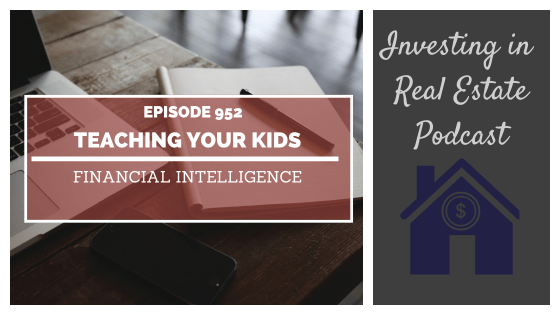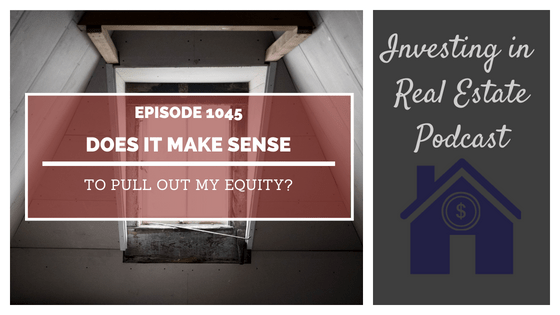
On our Q&A episodes, I answer three of your questions every week. A few weeks ago, I got a voicemail from an eleven-year old listener who asked how I teach my own kids about financial intelligence. I thought this was an amazing question, and the more I thought about it, the more I wanted to elaborate.
Today I’m going to reiterate what I told Drew, but also go a little deeper into some specific strategies you, as a parent, can use to teach your children financial intelligence. Click play to learn more about why financial education matters, and how to instill it into your family.
More About This Show
First, let’s talk about why financial literacy matters. Every year, The American Public Education Foundation’s Nation’s Report Card on Financial Literacy grades each state in the US on their financial education. As you can guess, the results are not good. In fact, they call financial illiteracy “an American epidemic.” I’ll link their report for you here. The report links financial illiteracy with many societal issues including bankruptcy filings, over-dependence on the government, and even suicide.
Their 2021 data shows that two-thirds of US states earned a grade of C (or worse!) in financial literacy instruction, with only 17 states earning grades of A or B.
I love this report and I think it’s highlighting a huge problem. But here’s the thing: their basis for what constitutes a financial education doesn’t meet my standards for what I want for my kids. I believe financial intelligence is so much more than learning basic economics or balancing a checkbook or avoiding high-interest credit cards. When you look at this report, a state that earned a high grade is really just doing the bare minimum, in my eyes.
For example, if you look at a state that earned an A, like Ohio, you’ll see that they met three simple guidelines:
- They have financial literacy standards for students K-12
- The OH dept. of education has a webpage that educators can access.
- They require a 1/2 credit personal finance course to graduate.
That’s it! So, let’s be honest: the bar is pretty low.
Now let’s get into some specific ways you can teach your children a comprehensive financial education.
Action Steps
- Don’t assume someone else will teach them. You probably already knew that schools in America don’t have high standards when it comes to teaching personal finance. Let this report solidify that for you. If you think your children are going to gain a financial education at school, that’s sadly not the case. If you want your children to succeed financially, the education is going to have to come from you.
- Play the liabilities vs. assets game at home. Teach them the distinction between the two, and then empower them to stay out of the liability trap.
- Turn to Robert Kiyosaki. If you want to learn about making your money work for you, there’s no better teacher than Robert Kiyosaki. Other than the popular book Rich Dad Poor Dad, Robert also has a cashflow board game and a book specifically for kids.
- Teach about spending with the Greenlight debit card. I don’t want to delve too far into this today, but Natali has an entire blog post about how we allocate funds to our kids and teach them about spending and saving. It’s a lot more efficient and realistic than using a piggy bank in our increasingly cashless society.
- Think about wealth as more than money. When you think about the legacy that you’re passing down, preserving and protecting wealth is really tied to your family’s mission and principles. It’s not just about dollars. The book Entrusted is a good place to start.
- Involve your children in your family business. There are many levels to this, and it depends on your kids’ ages and maturity levels. How can you involve them in conversations about your business? What lessons can you share with them? What type of work is age appropriate?
- Keep learning so you can keep teaching. The more you build your own financial education, the more lessons you will be able to teach your kids. Be committed to learning on a regular basis so you can pass down a strong foundation of financial intelligence.
Episode Resources
Book a Call with Our Team
The Nation’s Report Card
Rich Dad’s Cashflow Board Game
Rich Dad’s Escape from the Rat Race
Greenlight Debit Cards for Kids
Entrusted by Andrew Howell & David York
morrisinvest.com/bootcamp ← Download your FREE 90-Day Bootcamp!
Subscribe to Investing in Real Estate on iTunes
Find Your Financial Freedom Number
Subscribe to the Morris Invest YouTube channel
Like Morris Invest on Facebook
DISCLAIMER: I am not a financial adviser. I only express my opinion based on my experience. Your experience may be different. These videos are for educational and inspirational purposes only. Investing of any kind involves risk. While it is possible to minimize risk, your investments are solely your responsibility. It is imperative that you conduct your own research. There is no guarantee of gains or losses on investments.
AFFILIATE DISCLOSURE: Some of the links on this channel are affiliate links, meaning, at NO additional cost to you, I may earn a commission if you click through and make a purchase and/or subscribe. However, this does not impact my opinion. We recommend them because they are helpful and useful, not because of the small commissions we make if you decide to use their services. Please do not spend any money on these products unless you feel you need them or that they will help you achieve your goals.
Ready To Build Passive Income Through Rental Real Estate?
Ready to talk about your goals? We're here to show you the tools and teach you the process to begin earning legacy wealth for you and your family.








